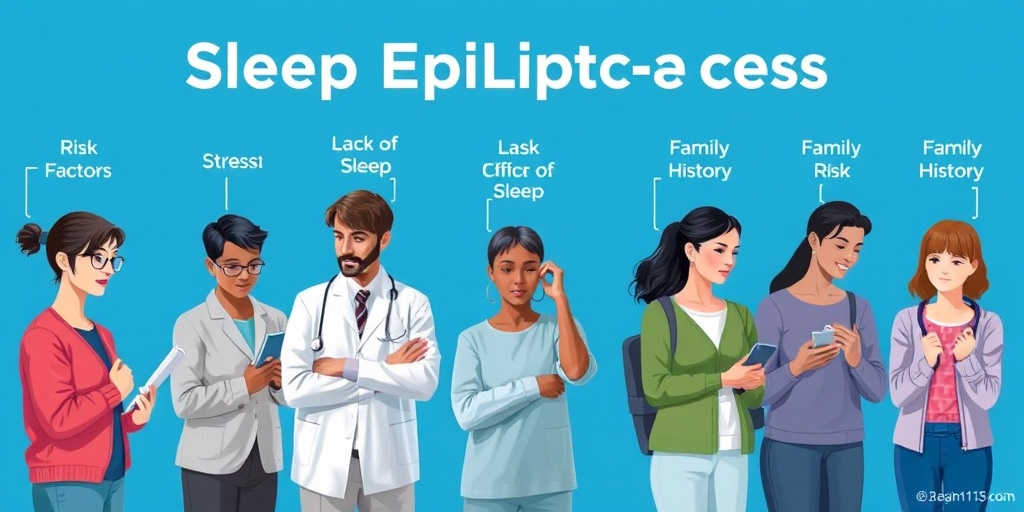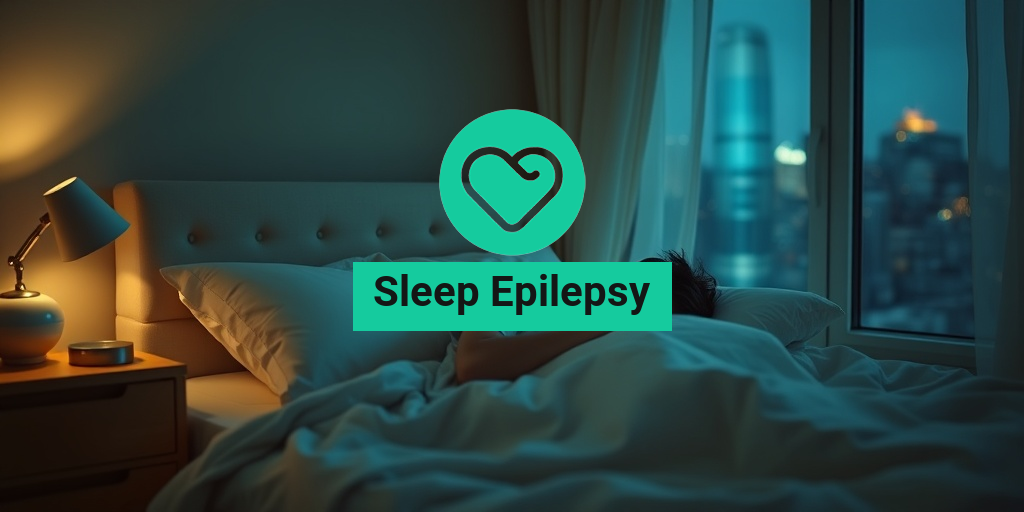What Is Sleep Epilepsy?
Sleep epilepsy, also known as nocturnal seizures, is a type of epilepsy that occurs during sleep. This condition can lead to seizures that disrupt the normal sleep cycle, often without the individual being aware of them. While epilepsy is commonly associated with seizures that happen while a person is awake, sleep epilepsy presents unique challenges and symptoms that can significantly affect a person’s quality of life.
Understanding sleep epilepsy is crucial for both patients and caregivers. It can manifest in various ways, and recognizing its signs can lead to better management and treatment options. The seizures associated with sleep epilepsy can vary in intensity and duration, and they may occur in different stages of sleep.
How Sleep Epilepsy Differs from Other Types of Epilepsy
Unlike typical epilepsy, where seizures occur during waking hours, sleep epilepsy specifically targets the sleep phase. This can make diagnosis tricky, as many individuals may not recall having seizures. Instead, they might experience symptoms such as:
- Unexplained injuries or bruises
- Confusion upon waking
- Excessive daytime sleepiness
Sleep epilepsy can also be influenced by various factors, including stress, sleep deprivation, and certain medications. Understanding these triggers is essential for effective management.
Symptoms of Sleep Epilepsy
The symptoms of sleep epilepsy can vary widely among individuals, but there are some common signs to watch for. Recognizing these symptoms early can lead to timely intervention and treatment.
Common Symptoms
Individuals with sleep epilepsy may experience a range of symptoms, including:
- Seizures during sleep: These can manifest as convulsions, twitching, or unusual movements.
- Confusion upon waking: Many people report feeling disoriented or confused after a seizure.
- Excessive daytime sleepiness: This can be a result of disrupted sleep patterns caused by nocturnal seizures.
- Memory lapses: Some individuals may have difficulty recalling events that occurred during the night.
Specific Symptoms in Different Age Groups
Sleep epilepsy can affect individuals of all ages, including children and pets. Here’s how symptoms may vary:
- In Children: Symptoms may include bedwetting, unusual movements during sleep, or sudden awakenings with confusion.
- In Dogs: Pets may exhibit signs such as twitching, paddling, or vocalizing during sleep, which can be alarming for pet owners.
When to Seek Medical Advice
If you or a loved one experiences any of the symptoms mentioned above, it is essential to consult a healthcare professional. A proper diagnosis often involves a combination of medical history, sleep studies, and possibly an EEG (electroencephalogram) to monitor brain activity during sleep.
For those seeking more information on sleep epilepsy, including treatment options and management strategies, resources like Yesil Health AI (yesilhealth.com) can provide evidence-based answers tailored to your needs.
In conclusion, understanding sleep epilepsy is vital for effective management and improving the quality of life for those affected. By recognizing the symptoms and seeking appropriate medical advice, individuals can take proactive steps toward better health and well-being. 🌙✨

Causes of Sleep Epilepsy
Sleep epilepsy, also known as nocturnal epilepsy, is a type of epilepsy that occurs during sleep. Understanding the causes of sleep epilepsy is crucial for effective management and treatment. While the exact cause can vary from person to person, several factors contribute to the onset of this condition.
Genetic Factors
One of the primary causes of sleep epilepsy is genetic predisposition. Certain genetic mutations can increase the likelihood of developing epilepsy, including sleep-related seizures. If you have a family history of epilepsy, your risk may be higher.
Brain Injuries and Structural Abnormalities
Brain injuries, whether from trauma, stroke, or infections, can lead to the development of epilepsy. Structural abnormalities in the brain, such as tumors or malformations, can also trigger seizures during sleep. These conditions disrupt normal brain activity, leading to seizures.
Sleep Disorders
Sleep disorders, such as sleep apnea or restless leg syndrome, can exacerbate the risk of sleep epilepsy. Poor sleep quality can lead to increased seizure activity, making it essential to address any underlying sleep issues.
Metabolic and Chemical Imbalances
Certain metabolic disorders and imbalances in brain chemicals, such as neurotransmitters, can contribute to the development of sleep epilepsy. For instance, low levels of magnesium or calcium can affect neuronal excitability, increasing the likelihood of seizures.
Environmental Triggers
Environmental factors, such as exposure to flashing lights or specific sounds, can also trigger seizures in individuals with sleep epilepsy. Stress, lack of sleep, and excessive alcohol consumption are additional triggers that can lead to nocturnal seizures.
Risk Factors for Sleep Epilepsy
Identifying the risk factors for sleep epilepsy can help in early detection and management of the condition. While not everyone with these risk factors will develop sleep epilepsy, being aware of them can be beneficial.
Age and Gender
Sleep epilepsy can affect individuals of any age, but it is more commonly diagnosed in children and young adults. Additionally, some studies suggest that males may be at a higher risk than females, although the reasons for this disparity are not entirely understood.
Family History
A family history of epilepsy significantly increases the risk of developing sleep epilepsy. If a close relative has experienced seizures, it’s essential to discuss this with a healthcare provider, as genetic factors may play a role.
Previous Seizures
Individuals who have experienced seizures in the past are at a higher risk of developing sleep epilepsy. This includes those with a history of febrile seizures in childhood or other types of epilepsy. Monitoring and managing previous seizure activity is crucial.
Coexisting Medical Conditions
Certain medical conditions, such as cerebral palsy, autism spectrum disorders, or neurodegenerative diseases, can increase the risk of sleep epilepsy. These conditions may affect brain function and increase susceptibility to seizures.
Substance Use
Substance use, particularly alcohol and recreational drugs, can significantly increase the risk of seizures during sleep. These substances can alter brain chemistry and disrupt normal sleep patterns, leading to an increased likelihood of nocturnal seizures.
Stress and Sleep Deprivation
High levels of stress and chronic sleep deprivation are known to be significant risk factors for sleep epilepsy. Stress can trigger seizures, while lack of sleep can lower the seizure threshold, making it essential to prioritize good sleep hygiene and stress management techniques.
Understanding the causes and risk factors of sleep epilepsy is vital for effective management and treatment. If you or a loved one is experiencing symptoms, it’s important to consult with a healthcare professional for proper evaluation and care. 💤

Diagnosis of Sleep Epilepsy
Diagnosing sleep epilepsy can be a complex process, as it often requires a thorough understanding of both epilepsy and sleep disorders. This condition, characterized by seizures that occur during sleep, can be challenging to identify due to the overlap of symptoms with other sleep-related issues. Here’s a closer look at how healthcare professionals diagnose sleep epilepsy.
Understanding the Symptoms
The first step in diagnosing sleep epilepsy is recognizing the symptoms. Common signs include:
- Unexplained nighttime seizures: These may manifest as convulsions, twitching, or unusual movements during sleep.
- Excessive daytime sleepiness: Individuals may feel unusually tired during the day, which can be a result of disrupted sleep patterns.
- Confusion upon waking: Some people may experience confusion or disorientation after a seizure.
- Witnessed episodes: Family members or partners may observe seizures occurring during sleep, providing crucial information for diagnosis.
Medical History and Physical Examination
A comprehensive medical history is essential. Your healthcare provider will ask about:
- Your personal and family history of epilepsy or other neurological disorders.
- Any previous sleep disorders or issues.
- Details about the frequency and nature of your seizures.
A physical examination may also be conducted to rule out other potential causes of seizures, such as metabolic disorders or infections.
Diagnostic Tests
To confirm a diagnosis of sleep epilepsy, several tests may be employed:
- Electroencephalogram (EEG): This test measures electrical activity in the brain and can help identify abnormal patterns associated with seizures.
- Polysomnography: A sleep study that records brain waves, oxygen levels, heart rate, and breathing during sleep. This test can help determine if seizures occur during sleep.
- Imaging tests: MRI or CT scans may be used to identify structural abnormalities in the brain that could contribute to seizures.
Once all the necessary information is gathered, your healthcare provider can make an informed diagnosis and discuss potential treatment options.
Treatment Options for Sleep Epilepsy
Treating sleep epilepsy involves a multifaceted approach tailored to the individual’s specific needs. The primary goal is to control seizures and improve overall quality of life. Here are some common treatment options:
Medications
Antiepileptic drugs (AEDs) are often the first line of treatment for sleep epilepsy. These medications work by stabilizing electrical activity in the brain. Some commonly prescribed AEDs include:
- Lamotrigine: Effective for various types of seizures, including those occurring during sleep.
- Levetiracetam: Known for its broad-spectrum efficacy and relatively mild side effects.
- Valproate: Often used for generalized seizures, it can also be effective for sleep-related seizures.
It’s crucial to work closely with a healthcare provider to find the right medication and dosage, as individual responses can vary significantly.
Lifestyle Modifications
In addition to medication, certain lifestyle changes can help manage sleep epilepsy:
- Establishing a regular sleep schedule: Going to bed and waking up at the same time each day can improve sleep quality.
- Avoiding triggers: Identifying and avoiding potential seizure triggers, such as stress, alcohol, or certain medications, can be beneficial.
- Practicing good sleep hygiene: Creating a comfortable sleep environment and minimizing disturbances can enhance sleep quality.
Alternative Therapies
Some individuals may explore alternative therapies to complement their treatment plan. These can include:
- Cognitive Behavioral Therapy (CBT): This can help address anxiety or stress that may exacerbate seizures.
- Dietary changes: Some people find success with ketogenic diets, which may help reduce seizure frequency.
- Biofeedback: This technique teaches individuals to control physiological functions, potentially reducing seizure occurrences.
It’s essential to discuss any alternative therapies with a healthcare provider to ensure they are safe and appropriate for your situation.
In conclusion, diagnosing and treating sleep epilepsy requires a comprehensive approach that includes medical evaluation, lifestyle changes, and possibly medication. By understanding the condition and working closely with healthcare professionals, individuals can effectively manage their symptoms and improve their quality of life. 🌙

Managing Sleep Epilepsy at Home
Sleep epilepsy, a condition characterized by seizures that occur during sleep, can be challenging to manage. However, with the right strategies, individuals can effectively control their symptoms and improve their quality of life. Here are some practical tips for managing sleep epilepsy at home.
Establish a Consistent Sleep Routine
One of the most effective ways to manage sleep epilepsy is by maintaining a consistent sleep schedule. Going to bed and waking up at the same time every day helps regulate your body’s internal clock, which can reduce the frequency of seizures. Aim for 7-9 hours of quality sleep each night.
Create a Sleep-Friendly Environment
Your sleep environment plays a crucial role in managing sleep epilepsy. Consider the following tips to create a calming atmosphere:
- Darkness: Use blackout curtains to block out light.
- Quiet: Use earplugs or a white noise machine to minimize disturbances.
- Comfort: Invest in a comfortable mattress and pillows.
Monitor Triggers
Identifying and avoiding potential triggers can significantly help in managing sleep epilepsy. Common triggers include:
- Stress: Practice relaxation techniques such as meditation or deep breathing.
- Caffeine: Limit caffeine intake, especially in the afternoon and evening.
- Alcohol: Avoid alcohol, as it can disrupt sleep patterns.
Keep a Sleep Diary
Maintaining a sleep diary can help you track your sleep patterns and seizure occurrences. Note the following:
- Bedtime and wake-up time
- Duration and quality of sleep
- Any seizures experienced during the night
- Dietary habits and stress levels
This information can be invaluable for your healthcare provider in adjusting your treatment plan.
Consult with Healthcare Professionals
Regular check-ins with your healthcare provider are essential for managing sleep epilepsy. They can help you:
- Adjust medications if necessary
- Provide guidance on lifestyle changes
- Offer support and resources for coping with the condition
Living with Sleep Epilepsy
Living with sleep epilepsy can be daunting, but understanding the condition and implementing effective management strategies can lead to a fulfilling life. Here are some insights into living with sleep epilepsy.
Understanding Sleep Epilepsy
Sleep epilepsy is a type of epilepsy where seizures occur primarily during sleep. These seizures can disrupt sleep quality and lead to daytime fatigue. It’s important to recognize the symptoms associated with sleep epilepsy, which may include:
- Unusual movements during sleep
- Confusion upon waking
- Excessive daytime sleepiness
Communicate with Family and Friends
Having a support system is vital for anyone living with sleep epilepsy. Openly communicate with family and friends about your condition. This can help them understand your needs and provide support when necessary. Consider discussing:
- What to do in case of a seizure
- How they can assist you in managing triggers
- Ways to create a supportive environment
Educate Yourself and Others
Knowledge is power. Educate yourself about sleep epilepsy and share this information with those around you. Understanding the causes, symptoms, and treatment options can empower you to take control of your condition. Resources such as books, reputable websites, and support groups can be beneficial.
Consider Lifestyle Adjustments
Making certain lifestyle changes can greatly improve your overall well-being. Here are some adjustments to consider:
- Regular Exercise: Engage in physical activity to reduce stress and improve sleep quality.
- Healthy Diet: Maintain a balanced diet rich in fruits, vegetables, and whole grains.
- Avoid Naps: Limit daytime naps to ensure better nighttime sleep.
Stay Informed About Treatment Options
There are various treatment options available for sleep epilepsy, including medications and lifestyle changes. Stay informed about the latest advancements in treatment and discuss them with your healthcare provider. This proactive approach can help you find the most effective management plan tailored to your needs.
Living with sleep epilepsy may present challenges, but with the right strategies and support, you can lead a fulfilling life. Remember, you are not alone in this journey! 🌟

Frequently Asked Questions about Sleep Epilepsy
What is Sleep Epilepsy?
Sleep epilepsy refers to a type of epilepsy where seizures occur primarily during sleep. This condition can significantly impact a person’s quality of sleep and overall health.
What are the symptoms of Sleep Epilepsy?
Common symptoms of sleep epilepsy include:
- Unexplained nighttime movements
- Confusion upon waking
- Excessive daytime sleepiness
- Memory lapses
How is Sleep Epilepsy diagnosed?
Diagnosis typically involves a combination of medical history, sleep studies, and possibly an EEG (electroencephalogram) to monitor brain activity during sleep.
What treatments are available for Sleep Epilepsy?
Treatment options for sleep epilepsy may include:
- Antiepileptic medications
- Lifestyle changes, such as improved sleep hygiene
- In some cases, surgery may be considered
Can Sleep Epilepsy occur in children?
Yes, sleep epilepsy can occur in children. It is essential for parents to monitor their child’s sleep patterns and consult a healthcare professional if they notice any concerning symptoms.
Is Sleep Epilepsy common in dogs?
Yes, dogs can also experience sleep epilepsy. Pet owners should look for signs such as twitching or unusual movements during sleep and consult a veterinarian for proper diagnosis and treatment.
Can I drive if I have Sleep Epilepsy?
Driving with sleep epilepsy can be risky. It is crucial to discuss your condition with a healthcare provider to determine when it is safe for you to drive.
What causes Sleep Epilepsy?
The exact causes of sleep epilepsy are not fully understood, but factors may include genetic predisposition, brain injuries, or other underlying health conditions.
What medications are used to treat Sleep Epilepsy?
Common medications for sleep epilepsy include:
- Carbamazepine
- Lamotrigine
- Levetiracetam
Always consult a healthcare professional before starting any medication.
How can I manage Sleep Epilepsy effectively?
Effective management of sleep epilepsy may involve:
- Regular sleep schedule
- Avoiding triggers such as stress and lack of sleep
- Following your treatment plan as prescribed by your doctor




